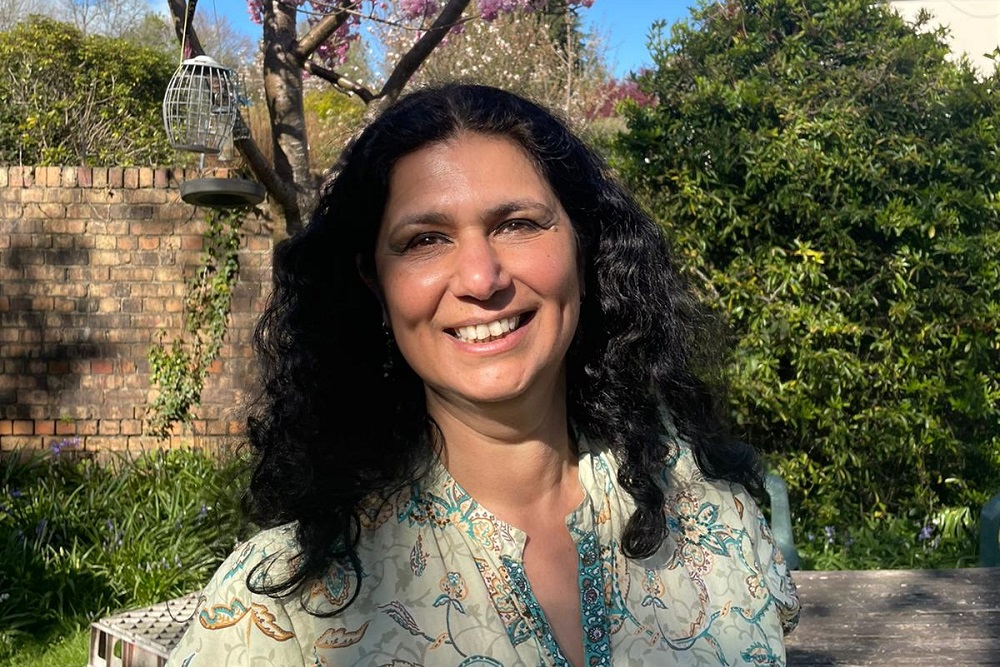Innovative course allows refugees to learn Welsh through their native languages

Refugees who have resettled in Wales are being offered the opportunity to learn Welsh, through their native languages, thanks to a new course provided by the University of South Wales.
Dysgu Cymraeg Morgannwg (Learn Welsh Glamorgan), based at USW, has been teaching the Croeso i Bawb (All are Welcome) course to refugees from all over the world, including Ukraine, Syria, Russia and many other countries.
The free course, which aims to introduce Wales and the Welsh language to people who speak little to no English, is growing in popularity with refugees who have resettled in communities across south Wales.
Croeso i Bawb is a package of resources through the medium of five different languages – Ukrainian, Cantonese, Syrian Arabic, Farsi and Pashto – using images and videos all about Wales, including information on famous people and places, the history of the language, the arts, legends and sport.
Nushin Chavoshi-Nejad, a Welsh tutor for Dysgu Cymraeg Morgannwg who teaches the Croeso i Bawb course, is originally from Iran and became a fluent Welsh speaker after starting evening lessons more than 30 years ago.
Varsi
Having moved to the UK at the age of 10, Nushin’s first language is Varsi but she can also speak French, Spanish and English fluently, and has taught them all throughout her career.
As one of the first Dysgu Cymraeg Morgannwg tutors to deliver the course to refugees, Nushin knew how important it was to consider the needs of learners who have arrived in Wales without knowing a great deal about their new home.
“Our aim for Croeso i Bawb is to move away from teaching Welsh through the medium of English, using methods that are similar to teaching ESOL [English for Speakers of Other Languages] to deliver the course in a different way,” said Nushin.
“We bring together people from completely different backgrounds and talk about everything from culture, food, history etc – it is a great way of helping refugees to make new friends while navigating the various things they need to adjust to life here.
“We chat about who they are and what they enjoy doing, while being mindful of the difficult situations they may have been in before coming to Wales.
“A lot of our learners have enjoyed the course so much that they want to continue learning Welsh in the mainstream lessons we offer, which is so exciting and a great sign that they feel happy and welcomed in their new communities.”
Kharkiv
Alina Shestak, from Kharkiv, Ukraine, came to live with a host family in Merthyr Tydfil last year, and decided to learn Welsh after finding voluntary work as a teaching assistant in a local primary school.
She found that when the children asked her questions in Welsh, or needed help with spelling Welsh words, she wasn’t able to understand them, and so she started the Croeso i Bawb course held at Merthyr Central Library.
Since learning Welsh, Alina has joined a choir in Nelson, and recently learned to sing Calon Lân, after transcribing the lyrics into Ukrainian to make sure she could pronounce them correctly in Welsh.
Nushin added: “Alina found out about the course through Belinda Foulkes, the local co-ordinator for the Ukrainian community at Merthyr Tydfil Council, who does an excellent job in supporting this community with every aspect of their needs, from housing, to education and finding jobs.
“Alina is looking forward to practicing her newly acquired pronunciation skills in Welsh in the choir’s next concert in July, and helping the primary school children with their Welsh. Her English is excellent and she has made phenomenal progress in learning Welsh in the little time she’s been attending the class.
“Apart from learning Welsh, the class provides an opportunity for people from Ukraine to spend time together, have fun and forget about their problems for a couple of hours. Alina has told me that she is glad to be living in Wales, where she says people have been extremely helpful and kind.”
Support our Nation today
For the price of a cup of coffee a month you can help us create an independent, not-for-profit, national news service for the people of Wales, by the people of Wales.





Yes, this is excellent news. Reach out to people and nation build.
Da iawn,wir. Some of our new arrivals put to shame those natives who present feeble excuses for not learning Cymraeg.
It doesn’t help that the environment outside of learning contexts is often somewhat less than ‘learner friendly’ and that many public bodies (who have statutory obligations to provide services in Cymraeg) aren’t exactly pro active in offering services in Cymraeg to fluent speakers, let alone offer a reassuring and supportive environment so that learners can feel comfortable in using their initially limited skills in Cymraeg that encourages them to make further efforts. It’s high time that there was legislation brought in it make it compulsory for all bodies, both in the public and private sector to properly embrace bilingualism in… Read more »